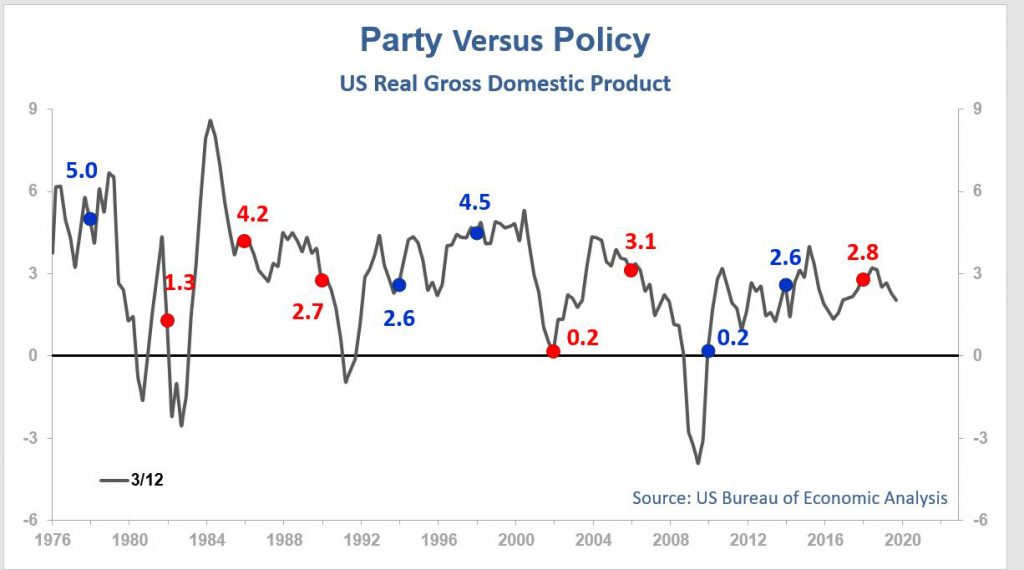Policy Versus Politics: What Matters?
Complicating everything, we have officially entered a presidential election year. That and the fact that the U.S. economy is slowing down make for two converging trends likely to yield grotesquely irresponsible economic reporting and high uncertainty over the next year.
At ITR Economics, we do not favor either political party when it comes to our economic analysis. Policy can matter, but history has shown that whichever party is in the White House does not.
The chart illustrates one of the reasons why. The quarterly growth rate for the U.S. GDP (adjusted for inflation) is presented. The blue dots mark the end of the first year of a Democrat’s term in the Oval Office; the red dots depict the same for a Republican. From our perspective, it is not possible to statistically demonstrate that superior growth, or the lack thereof, can be laid at the feet of one party or the other.
From 1976 to the present, the average GDP rate-of-change during Republican administrations was 2.81%; for Democratic administrations, the average was 2.85%. All of this leads us to the point we strive to make in our presentations and conversations: its policies and what ultimately becomes law or rule or executive order that can (at times) matter, not the party.

At ITR we will keep an eye on any proposed policies that gain ground as the election cycle heats up and provide commentary on whatever business implication they may have. Your job is to keep your head above the political noise this year and focus on running the business.
Residential Contractors: Find and Keep Good People
Despite the macroeconomic slowdown underway, finding and keeping talent will remain an issue. U.S. Employment of Building Equipment Contractors, which includes electrical and wiring installation contractors; plumbing, heating, and air conditioning contractors; and other building equipment contractors, averaged an all-time high of 2.26 million individuals during the most recent 12 months.
Hiring is showing tentative signs of slowing, but Employment is still up 4.0% from the same period a year ago. Expect overall hiring to slow nationally into 2020, but the trend will stop well short of the rising unemployment typically observed during macroeconomic downturns.
This is not that kind of cycle.
HVAC contractors should leverage the slower hiring in 2020 to pick up additional talent.
Contractors in the residential HVAC space need to attack 2020 with optimism and an aggressive strategic plan. Yes, the overall economy will be slowing through the early stages of 2020, and the noise emanating from the media surrounding the election will be deafening.
Remember that your market ‘ the U.S. housing industry ‘ is a leading sector and already taking flight as we advance through the first quarter of 2020.
Identify where your bottlenecks were during the last business cycle peak in 2018 and where they may again become an issue as things accelerate during 2020. Take steps to improve them. You do not have to wait until things get busier. Don’t react to the business cycle; think ahead of it.
Connor Lokar is a Program Economist at ITR Economics, a 72-year-old economic research and consulting firm. Lokar specializes in the construction industry and provides economic consulting services for businesses, HVAC trade associations, and Fortune 500 companies. He is a graduate of the economics department at the University of Michigan. His economic insight and forecasting experience play a key role in ITR Economics? 94.7% forecast accuracy. To learn more about ITR Economics, visit
www.itreconomics.com. Follow Lokar on LinkedIn (ncilink.com/ConnorLokar).













Recent Comments